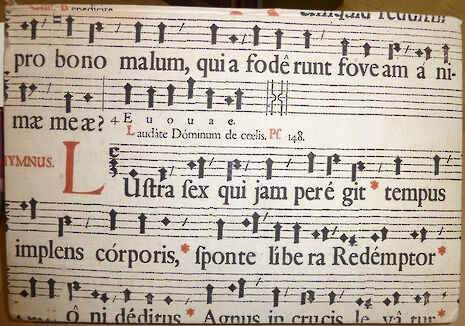Concert: CUMS Chorus
James Taylor‘s ear was left delighted by CUMS’s supreme performance of three psalm-settings

In their rendition of three renowned Baroque Psalm-settings, Cambridge University Music Society delighted the ear with an energetic and rhythmically tight performance that imbued these works with something new. It being my first visit to West Road Concert Hall, I was thoroughly impressed with the venue’s acoustics. Despite a less than optimal seat in the first half, the music came in mighty waves, filling every corner of the hall.
The performance began with Bach’s Cantata no. 196, Der Herr denket an uns. The first chorus was brought glowingly to life with gusto, the conductor Ralph Woodward skilfully bringing out the full contrapuntal depth in Bach’s notes. The first aria, performed by soprano Rachel Ambrose Evans, delivered complex passages of heavy ornamentation with effortless lyrical simplicity. A tenor and bass duet followed which, while perhaps slightly lacking in dynamic variation, was tight in execution.
Rameau’s setting of Psalm 84 Quam dilecta tabernacula opened with light, gentle passages of lilting communication between strings and flute. Although the mezzo-soprano passages delivered by Helen Charlston occasionally felt strained, the soloist performances were mostly highly polished. The chorus exhibited a masterful handing of Rameau’s counterpoint, attentively and sensitively voicing each and every layer. Poor pitching in the upper strings took away from the harmonic brilliance now and then; however, this was a small glitch amid otherwise highly competent playing.
The night ended with Handel’s Dixit Dominus, which was well-placed in the programme, allowing the concert to finish with a work in which all soloists came into their own - Camilla Seale’s contributions were particularly outstanding.
Overall, CUMS gave a supreme performance, introducing new warmth and vivacious colour to these celebrated psalm-settings of the High Baroque. A sense of Woodward’s love for the works was conveyed by his sensitive yet strong conducting, an emotion which was reciprocated by the performers, enriching the great music.
 News / Police to stop searching for stolen Fitzwilliam jade17 April 2024
News / Police to stop searching for stolen Fitzwilliam jade17 April 2024 Interviews / ‘It fills you with a sense of awe’: the year abroad experience17 April 2024
Interviews / ‘It fills you with a sense of awe’: the year abroad experience17 April 2024 News / Night Climbers call for Cambridge to cut ties with Israel in new stunt15 April 2024
News / Night Climbers call for Cambridge to cut ties with Israel in new stunt15 April 2024 Sport / Kabaddi: the ancient sport which has finally arrived in Cambridge17 April 2024
Sport / Kabaddi: the ancient sport which has finally arrived in Cambridge17 April 2024 Features / Cambridge’s first Foundation Year students: where are they now?7 April 2024
Features / Cambridge’s first Foundation Year students: where are they now?7 April 2024





